
The nomenclature Indo-Pacific as against Asia-Pacific was coined after a statement made by the then US Secretary of State, Hillary Clinton. US coined this terminology possibly due to the emerging geopolitics of the region and the emerging dynamics in the Indian Ocean with an imprint of the South China Sea (SCS). Thus far Chinese activism in the South China Sea was limited to disputes between ASEAN and China. While the U.S. remained preoccupied with GWOT (Global War on Terrorism), ISIS and now Ukraine, the Chinese economic and military might turn overbearing on smaller nations in the region. They largely obeyed the diktat of the Chinese without questioning its legitimacy, particularly on the issues of freedom of navigation and sovereignty of islands except for occasional grumbling. In the recent past, China has gone too far in exercising her claims to sovereignty by reclaiming over 2000 acres (8.1 sq km) in the SCS. China has exercised a slow and deliberate strategy of acquiring and building artificial islands, and maritime features by coercion and many times by force. Blockade of Taiwan from all sides and in a recent incident PLA Coast Guard ship ramming into a Philippines supply ship engaged in support operation within its own EEZ near Second Thomas Shoal has sent shockwaves amongst ASEAN armed forces.
China has built a 3000 Metres runway on the Fiery Cross Isle by reclaiming almost 1 sq km, giving her the ability to operate all types of aircraft IE Y 20 transport, J 10 and J 11 fighters from the Spratlys. The reclamation in the northern part of Spratlys has given China another 3.95 sq km reef which is adequate for a 3000 metre runway. This has provided her two long runways in north and south of Spratley, thus bolstering its ability to more stringent enforcements. vis a vis less capable nations of the ASEAN and curtailing the freedom of navigation of countries transiting in and out of SCS. This is a confrontationist challenge.
Esta historia es de la edición December 2023 de Geopolitics.
Comience su prueba gratuita de Magzter GOLD de 7 días para acceder a miles de historias premium seleccionadas y a más de 9,000 revistas y periódicos.
Ya eres suscriptor ? Conectar
Esta historia es de la edición December 2023 de Geopolitics.
Comience su prueba gratuita de Magzter GOLD de 7 días para acceder a miles de historias premium seleccionadas y a más de 9,000 revistas y periódicos.
Ya eres suscriptor? Conectar
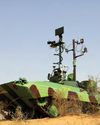
THE RISE OF UGVs REVOLUTIONISING TACTICAL AND STRATEGIC MILITARY OPERATIONS
MANOJ K CHANNAN explains the history of UGVs, their role in modern warfare, their integration with advanced technologies, and their broader implications for military operations, intelligence assessments, and human-machine collaboration

INNOVATIONS AND ADVANCEMENTS IN DEFENCE TECHNOLOGY BY MKU
The defence industry is evolving rapidly to address the dynamic challenges of modern warfare, and MKU is at the forefront of this transformation. In an exclusive interaction, VAIBHAV GUPTA, Director India Business of MKU highlights their innovative approaches, spanning advanced ballistic protection, cutting-edge night vision and thermal imaging technologies, and strategic partnerships to enhance India's defence capabilities. From pioneering protective solutions for soldiers to leveraging indigenous technological breakthroughs, MKU continues to redefine the benchmarks of excellence in defence technology.
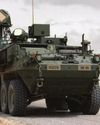
INDIA'S STRYKER CHOICE
India's selection of the US-made Stryker armored vehicle over the indigenous WhAP sparks debates on prioritiSing swift acquisitions and combat readiness versus commitment to self-
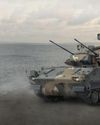
HANWHA AEROSPACE DEEPENS INDIA DEFENSE TIES AMID REGIONAL TECH RACE
Amid growing regional competition in defence technology, a prominent defence initiative is strengthening ties with India through successful artillery and air defence programs. This collaboration aligns with India's strategic focus on bolstering domestic defence manufacturing and reducing reliance on imports. By fostering advanced technology transfer and enhancing local production capabilities, the partnership is poised to transform the defence landscape in Asia, showcasing significant achievements in artillery systems, air defence solutions, and aerospace innovation

ADVANCING INDIA'S DEFENCE CAPABILITIES
Larsen & Toubro (L&T) is advancing India’s defence ecosystem with ground breaking innovations, including next-generation combat platforms, autonomous technologies, and cutting-edge systems, underscoring its commitment to India’s military modernisation, highlights ARUN RAMCHANDANI, SVP & Head – L&T Precision Engineering and Systems IC
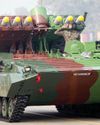
NEED FOR A LARGER ARTILLERY FORCE
At a time when India is increasingly facing a multi-front challenge on her borders, it is quite evident that the Indian artillery modernisation programme needs a massive thrust from the government, argues JYOTI SINGH
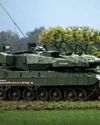
FORCE PROTECTION
The Indian Army faces an urgent need to equip Main Battle Tanks and Armoured Fighting Vehicles with advanced Active Protection Systems to counter modern threats and enhance battlefield survivability. The lack of such systems could be addressed with the combat-proven Trophy APS, writes ATUL CHANDRA
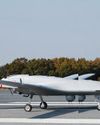
THE INDIAN ARMY AND DRONES
AMIT GUPTA argues why the induction of Drones, which have changed the face of modern warfare, into the Indian Army needs to be in greater numbers

TECHNOLOGICAL SYNERGY REDEFINED: IAI'S COMMITMENT TO INDIA-ISRAEL INNOVATION
BRIG. GEN. (RES) EYTAN ESHEL, Executive Vice President of Technology, Chief Technology Officer (CTO), R&D and Innovation of IAI, highlights how nearly 40 years of India-Israel collaboration has fostered innovation, leveraging India's deep-tech talent for global aerospace and defence advancements while promoting sustainability and co-developing solutions with Indian startups and institutions.

INDIA EMBARKS ON DECADE-LONG PROJECT TO DEVELOP FUTURE-READY COMBAT VEHICLE
With a substantial portion of its borders shared with neighbouring countries, it is essential for India to have modern and robust tanks for both defensive and offensive operations. In this regard, the FRCV's advanced capabilities allow it to face changing ground obstacles like land and air threats. It will provide a decisive advantage in future conflicts and enhance operational effectiveness through its integration with air power, writes JOSEPH P CHACKO